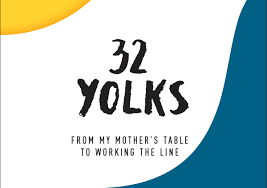A former student of mine got me to read out of my comfort zone, and for once, I am glad I did so. I don’t normally dive into memoirs, but she recommended Eric Ripert’s 32 Yolks to me (which was also co-written by Veronica Chambers) and I don’t regret it. Also known as the late Anthony Bourdain’s BFF, Eric Ripert is a Michelin star chef, and in this memoir, he details everything that has happened in his formative years to how he ended up working as a professional chef.
Warning: Spoilers below.
While that is the neat summary of the book, I was not prepared for the trauma that pervaded the chef’s formative years. As soon as he was five years old, his parents divorced as his father was unfaithful. Because of this, there was constant yelling and screaming as his parents tried to resolve their marital issues.
But what hit me was this:
As for me, I went from being a happy kid to a pint-size depressive. From the time I was five until I went away to cooking school and for many years after, I was rarely truly happy–just different degrees of sad.
Ripert also detailed his childhood traumas, like how he went to a boarding school and a priest attempted to molest him. After mentioning this to his mother, she even refused to withdraw him and even insisted that he remained at school. There was also the physical and emotional abuse from his stepfather, as well.
Not everyone has the courage to step up and write about their childhood traumas. That in and of itself was sobering. He detailed how affected he was, but it was never “poor little me, boo hoo”. It’s a candid look at his life and difficulties, and what he did to overcome it.
However, what saved Ripert was his friend, who ran his own restaurant, and who also encouraged him to be a chef. Although the abuse in his life never really abated until he presumably went to America, Ripert managed to find the strength and power in cooking. As his chef friend put it:
“Only if you cook what you love and truly understand will people be happy with your food. Running a restaurant is not a popularity contest. It is not really any way to get rich. But you can make beautiful food and you can make life your way,” he told me one day when he was writing out the menu on the chalkboard. “C’est toi qui décides. It must be you who decides.”
That, to me, is the essence of the book. It was eye opening to see what went on behind-the-scenes of a Michelin-star restaurant — verbal and emotional abuse in a high pressure environment, what impressed me was Ripert’s resilience, and how he doggedly chased after his dream to cook good food and pursue the kind of life he wanted to live.
The more technical aspects are touched on as well, but it’s not too difficult for a layman to understand because Ripert probably had Chambers to help him along the way. It is simply written and accessible, definitely for anyone who would like to know more about the people who run the restaurant industry.
The book was so good that I missed my bus stop while reading it, and I closed it wondering what happened after that. Of course, I could google what happened to Ripert, but I wanted it to be told in the form of a story. I know he becomes successful in the end, but I wished the book detailed what happened after he went to America to seek his fortune. I wanted to know how Ripert learned English, and how he fought all of his inner demons due to trauma.
I think I’m going to read more memoirs, and I’m hoping for a continuation of this book. Often, I remind myself that chefs are people too, but the rigour that they go through is superhuman. Never will I look at my food the same way again, knowing that someone may have slaved over it and trained, under duress, to do up the dots on those fancily plated meals.
